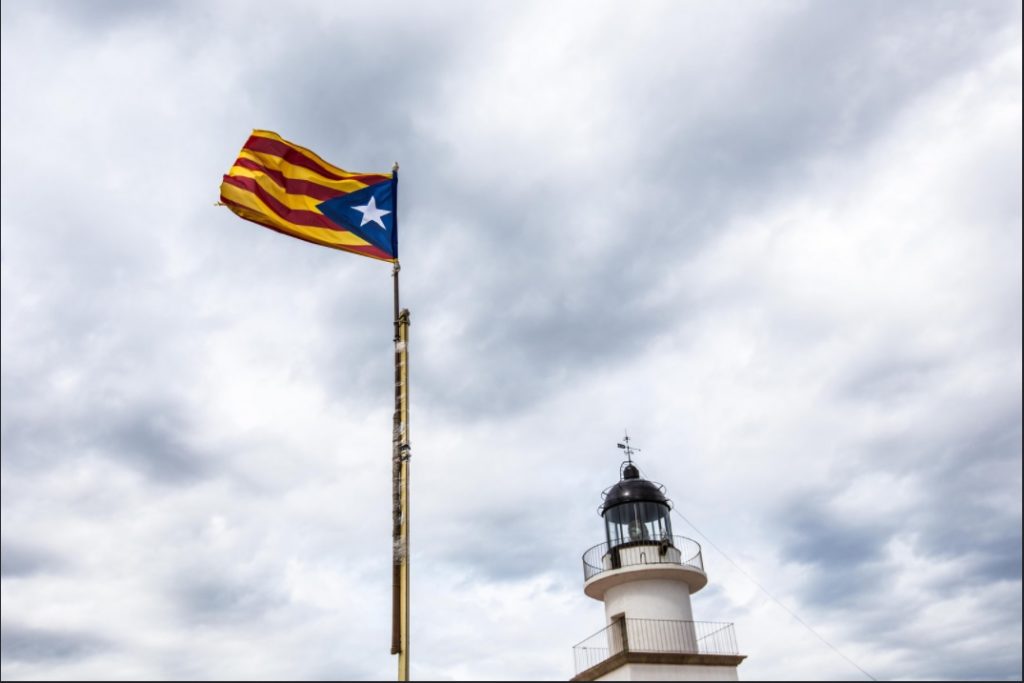
Emi: Polarization. Again.
Caos. Crisis. Oportunidad. Independencia – Words that Spanish press have used in the last few months to report on and attempt to make sense of the Catalan independence movement. As with any politically fraught situation, opinions are divided, the process is messy and any solution seems difficult to reach. It could be clarifying to look at the people’s viewpoints in case this is party politics or simply a power struggle among politicians, yet the citizens’ opinions are split as well. This case is especially polarized with both Spanish and Catalan politicians refusing to listen to the voices of the moderate – citizens who do not support full Catalan independence from Spain but who want to keep the region’s autonomy.
Catalan’s president declared independence October 27. Soon after Spain dismissed the president and his Cabinet and dissolved the Catalan Parliament of all its powers.
Catalonians are angry. Naturally. Their representatives forced the issue of full secession from Spain so that now the region has lost every bit of autonomy that it once held. This pendulum of politics from one extreme to another is reminiscent of governments in other parts of the world with the polarization in the U.S. Senate as a prime example. Division and disagreements within governments should lead to a healthy consensus that is beneficial for its citizens. However, polarization has become so extreme that it stagnates any progress on any rational decision or it leads to hasty declarations like in this case. If politicians are supposed to represent the people’s best interests, then they’re doing quite an awful job of it by never listening to the opposing side or trying to work together. This pattern of polarization is steadily getting worse and it is unsettling to think of the world’s governments continuing in this direction.
Aziza: The silence of the European Union
In times of weakening bonds among European Union members, the bloc’s leaders fear little more than a wave of empowered independence movements potentially throwing some of its strongest pillar states into political instability and chaos. Northern Italy is home to such an independence movement, independence groups in Corsica have been active for decades, and Flanders has been flirting with the idea of splitting away from Belgium as well. If Catalonia were to successfully secede from Spain, independence movements around the continent could gain significant momentum.
So what should European Union leaders do? Thus far, they’ve remained silent. Leaders have called the crisis an “internal affair” and denounced calls for the European Union to take a stance. After Spanish police forcefully tackled protesters during the referendum, Donald Tusk, President of the European Council, tweeted: “For EU nothing changes. Spain remains our only interlocutor. I hope the Spanish government favours force of argument, not argument of force.”
Other international organizations were more explicit in their response. The United Nations High Commissioner for Human Rights, Zeid Ra’ad Al Hussein, said, “I am very disturbed by the violence in Catalonia on Sunday.” Human Rights Watch called for an independent investigation into the Spanish police strategy during the referendum. European Union leaders might perceive getting involved as too risky, fearing the spread of independence movements and growing internal instabilities in its member countries. But with EU leaders rarely shying away from an opportunity to criticize internal affairs in Poland and other Eastern European states, they may have something else to lose in Catalonia’s secession crisis: their credibility.
Katerina: Monarch of the few, not the many
A growing trend in 21st century monarchical politics has been a disappointing lack of action in time of internal crisis and unrest. Since tensions have escalated in Spain between the pro-independence coalition of Catalonia and the rigid central government, King Felipe of Spain has commented twice on the issue, both times condemning the Catalonian separatists. In late October, King Felipe stated that Spain was facing an “unacceptable secession attempt” which undermined Spain’s united, historical battle against a tyrannical dictatorship in the 1970s. Although his words seem praiseworthy, King Felipe has utterly marginalized a large portion of his nation due to his lack of empathy. This situation is largely reminiscent of Queen Elizabeth II’s ambivalence during the Scottish independence movement. Many criticized Her Royal Highness for calling for a united Britain, as many of her private residences were situated in Scotland. Although in the 21st century, monarchs have taken up a largely aesthetic and inactive role in both external and internal politics, their people expect more in times of crisis. The role of a modern monarch is to empathize with their people, understand their worries and fears (no matter how socio-economically removed they may be from them), and to act as an impartial voice in times of crisis.
Katya: Looking beyond the particularities of Catalonian independence, the movement forces us to reckon with the nature of the world we live in.
In the West today, ‘nationalism’ usually refers to right-wing, reactionary political movements–the Front National, the AfD, the current Republican administration in the US– that draw on feelings of ethnic, historic pride (and superiority). Whenever nationalist separatist movements do flare up, they tend to do so in peaceful, civilized and democratic ways. The Scots had their referendum; the IRA laid down their arms in 2005. The Texan secession movement is fought through bumper stickers, beer-fueled soliloquies at dinner tables and Confederate flags on front porches. Even staunchly pro-independence Texans recognize the absurdity of the claim (when they sober up), and the fact that less than 200 years have passed since the state was an independent country has no real or perceived political sway.
Violent (or successful) secession movements no longer have a place in polite political society–leave the fighting to the Ukrainians and the jihadists. Perhaps some believe (naively) in a post-violence, Western, democratic neoliberal order; perhaps these movements lack the gravity perceived as a prerequisite for violence.
Catalonia has shattered this perception. Last month, police injured hundreds of protesters in Barcelona, holding up a mirror to the West in the process. Using force against your own citizens as they peacefully assert their democratic will is a bad PR move in 2017, but how far would (and should) a ruler go to hold onto their territory? If the state, no matter how liberal and democratic, exists first and foremost as an end in itself (to prevent anarchy, protect the person and their property, etc–insert your own favorite social contract theory here), how far can a government go to prevent its own dissolution? National self-determination is a decidedly more comfortable value to leverage for your own (economic, strategic) ends in Eastern Europe or the Middle East than to grapple with at home. When citizens decide to pit their notions of liberty and happiness against the strength of your economy, how do you respond?
Spain reacted out of proportion, both in its use of force and in its dramatic political play this week. It would be wiser to let the movement rise and fall on its own timeline, but now, both the international community and the separatists themselves are forced to take the situation much more seriously. The courts will now take up the issue of legality, but no matter what happens next, a precedent for harsh crackdowns on nationalist separatists has been enacted. The irony is that in stripping the Catalonians of their autonomy, Spain is only fanning the flames of separatist movements, at home and abroad.
Luke: Reflections on the Revolution in Catalonia
I don’t claim to be an expert on European politics or independence movements, and I don’t know much about the recent independence referendum in Catalonia or the subsequent violence and intrigue. What I do know, from my readings of history, is that great questions of sovereignty and subjugation and revolution and the structure of governments- particularly when they’re tied up with great questions of identities, cultures, and ways of life- are rarely as singly moral as their participants and observers at times make them out to be.
So it is, I think, in Catalonia these days. It’s too easy to see the independence movement as the benign, progressive expression of national self-determination, and the Spanish government’s heavy-handed suppression attempts as the barbarous cruelty of a corrupt and illegitimate state with a totalitarian history. However, it’s just as easy to see the independence movement as a chaotic popular insurrection being fanned by demagogues, whose successful consummation could result not only in a weakened Spain, but a further polarized Europe already tottering on a precipice. Neither of these narratives is entirely true; neither is entirely false. Both are held fervently by participants in the drama; both are held by otherwise-disinterested observers.
There have occasionally been murmurings of outright secession and the outbreak of hostilities, a development that would assuredly raise the stakes and passions, and grind the conflict into something more closely resembling ethnic conflict in a failed state than the expression of modern democracy. This seems unlikely but not entirely impossible. More likely is the possibility of this long-simmering conflict reaching no particularly clear conclusion in the near term, with resentments and hatreds stewing further with every compromise reached. The full victory of either side- its attainment of its vision of justice- would be an injustice in itself, in its effects over the long run.
This is the return of history, the deepening cycle of tragic circumstance that will continue to define our disordered, postmodern 21st Century. Statesmen and activists alike should learn to live with moral ambiguity- not only such far-flung locales as Yemen, North Korea, Afghanistan, Nigeria, and Venezuela, but even in the very heart of the liberal world order itself.
The views expressed by the author do not necessarily reflect those of the Glimpse from the Globe staff, editors or governors.







